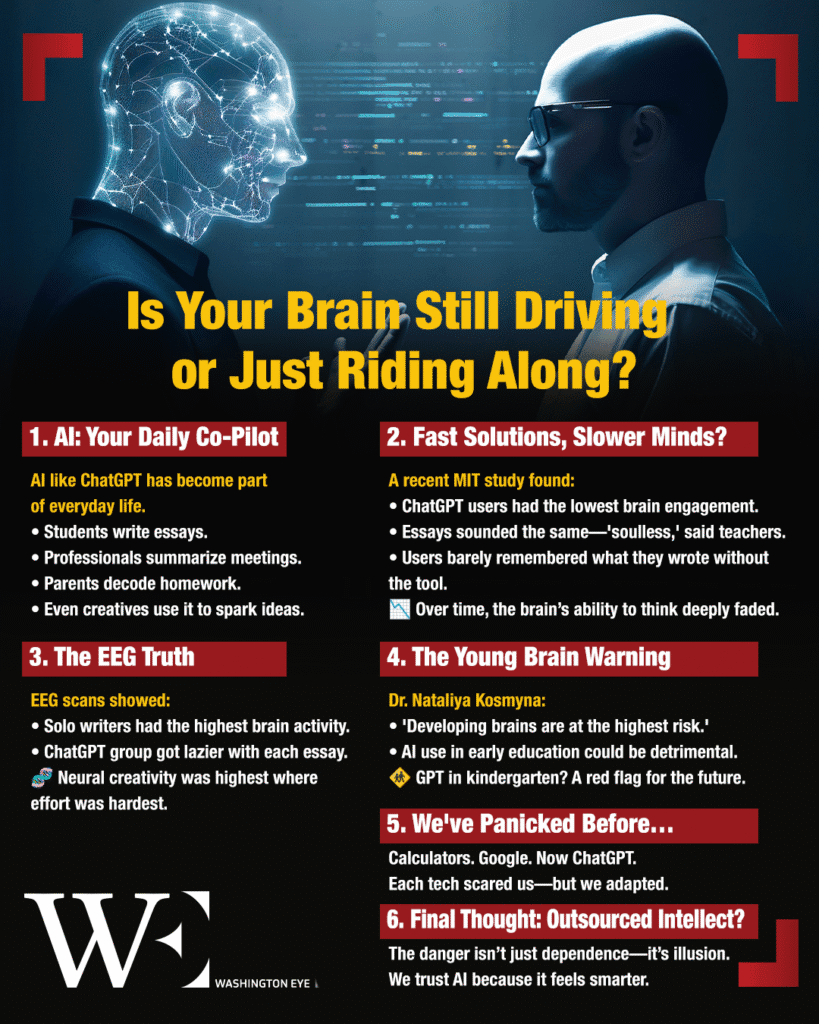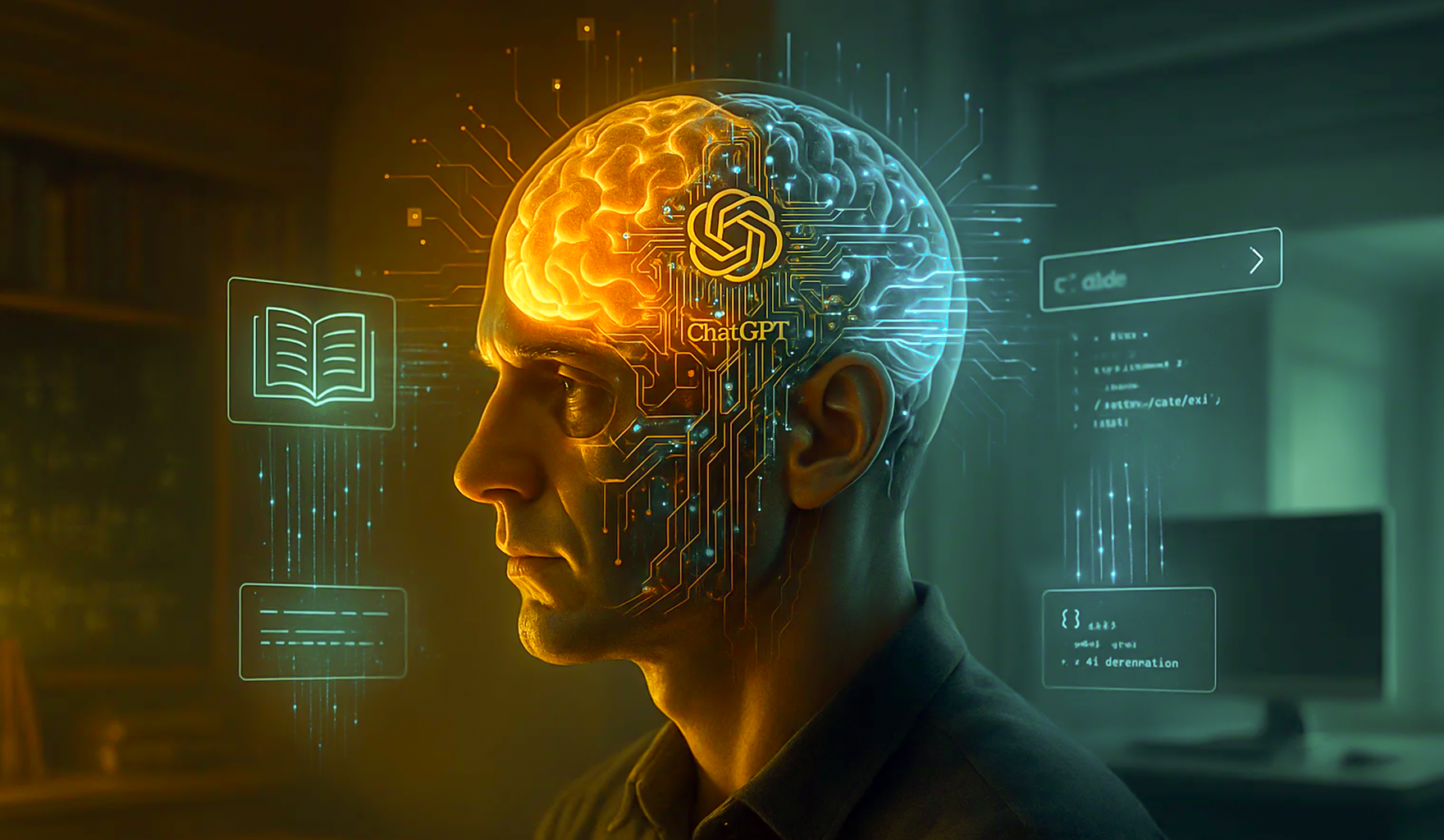Not long ago artificial intelligence (AI) felt like something too complicated or a latest technology that could only be figured out by a computer geek. But today, there’s not even a single day that passes without the assistance of ChatGPT. In today’s world, ChatGPT and similar AI tools feel as ordinary as how smartphones have become to us. Students depend on them to draft essays and assist them on completing their research papers; professionals use them to summarize meetings and polish work mails and parents prompt them to analyse their kids’ school assignments for understanding what to do. Even creatives, who were once considered irreplaceable, turn to ChatGPT to brainstorm new ideas and suggest changes in what they have done. But as these tools become seamlessly woven into our daily routines, one question strikes us deeply -What is this dependence doing to our human brains that had once made us do all the job without any assistance?
What makes ChatGPT undeniably attractive is that it gives instant solutions to any complicated problems. As our reliance on having any information quickly generated at our fingertips increases, scientists are now racing to understand how this frequent usage of large language model programs, or LLMs, affects our brains, majorly concerned with our ability to think critically, problem-solve independently, and have a diverse thought process.
The MIT Study That Shook the Internet
A few weeks ago, a study by MIT Media Lab sparked headlines. The mere thought of whether AI is actually making humans stupid and lazier day-by-day got a scientific answer and it blew the internet. The study divided 54 subjects aged 18 to 39-year-olds from Boston into three groups, and asked them to write several SAT essays using OpenAI’s ChatGPT, Google’s search engine, and nothing at all, respectively. Researchers used an electroencephalogram (EEG ) – a device that measures and records the electrical activity of the brain through electrodes placed on the scalp. The same method was used to record every writers’ brain activity from almost 32 regions, and found that – the ChatGPT users had the lowest brain engagement and “consistently underperformed at neural, linguistic, and behavioral levels.” Over the course of a few months, ChatGPT users got lazier with each subsequent essay, often resorting to copy-and-paste by the end of the study.
“Soul-less Essays” and Fading Memory
Ultimately, the subjects delivered essays that sounded alike and lacked personal – touches. English teachers who read the papers called them “soul-less.” Meanwhile, the “brain-only” group, those who received no assistance showed the greatest neural activations and stronger connections between brain regions. These connections correlated with better memory retention, more semantic accuracy, and a clearer sense of ownership over their writing. Members of the ChatGPT group were then invited to recreate one of their previous articles without the use of the tool during a follow-up session. But, they could barely recall what they had written.
The Risk to Younger Brains
According to the lead researcher Nataliya Kosmyna, this growing dependency is particularly alarming for younger generations. “Developing brains are at the highest risk,” she warned. While the study is still awaiting peer review and had a limited sample size, Kosmyna felt it was critical to release the results early.
“What really motivated me to put it out now before waiting for a full peer review is that I am afraid in 6-8 months, there will be some policymaker who decides, ‘let’s do GPT kindergarten.’ I think that would be absolutely bad and detrimental,” she says. “Developing brains are at the highest risk.” she added.
Her concern isn’t unwarranted. AI is already creeping into classrooms, lesson planning, and student assessments. While these tools might offer ease and efficiency, the MIT study indeed highlights a darker reality that our brains may be adapting too quickly to letting machines do all the hard work. The intellectual tug-of-war that once shaped our ideas, values, and originality is now being totally outsourced and we may not even realize what we’re losing in the process. As Kosmyna puts it, the danger now lies in this illusion. Perhaps the whole point of consuming this tool is that it makes itself look smarter than its users – and that’s how the trust came along.
We’ve Been Here Before Too
However, not everyone believes that this might be a disaster. Technological panic is not anything new. Years ago, educators feared that calculators would ruin children’s ability to do mental math and when Google became widely accessible, a wave of concern spread about the decline of memory, deep reading, and knowledge retention.
“And now that Google is more part of our everyday lives, it doesn’t feel so scary. ChatGPT is the new target for some of the concerns. We need to be very careful and balanced in the way that we interpret these findings.” said Sam J. Gilbert, professor of cognitive neuroscience at University College London.
So the key lies in balance. Use AI to support your thinking, but not to replace it. In a world where our new brain is often powered by ChatGPT, perhaps the smartest thing we can do is to remember how to think without it.

















